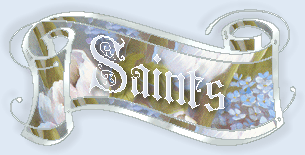  St. Cyprian, Bishop and Martyr September 16 c. 200-58 Probably born at Carthage, Thascius Caecilius Cyprianus was a pagan rhetorician, lawyer, and teacher. He was converted to Christianity by Caecilius, an old priest, about 246, became a profound scholar of the Bible and the great religious authors, especially Tertullian, was ordained, and in 248, was elected bishop of Carthage. Cyprian was forced to flee Decius' persecution of Christians in 249 but continued to rule his see by letter from his hiding place. Greatly criticized for fleeing, he returned in 251 to find that many of the faithful had apostatized during the persecution and that a priest named Novatus who had opposed his election was in schism and was receiving back into the Church with no penance those who had lapsed from the faith. Cyprian denounced Novatus for his undue leniency and convened a council at Carthage in 251, which set forth the terms under which the lapsed could be received back into the Church, excommunicated the schismatic leaders, and asserted the supremacy of the Pope; it was at this council that Cyprian read his famous De unitate ecclesiae. Novatus then went to Rome and joined the antipope, Novatian, against Pope Cornelius, whom Cyprian actively supported, rallying the African bishops behind Cornelius. In 252-54 Carthage was stricken with a terrible plague. Although Cyprian was a leader in helping alleviate its effects, the Christians were blamed for the plague, and hatred for Cyprian and the Christians intensified. It was at this time that he wrote De mortalite to comfort his flock. An imperial decree forbidding any assemblage of Christians and requiring all bishops, priests, and deacons to participate in the official state religion ushered in Valerian's persecution of the Christians. Cyprian was arrested, and when he refused to participate was exiled by Patemus, the proconsul, to Curubis, a small town fifty miles from Carthage. The following year an imperial decree ordered that all bishops, priests, and deacons were to be put to death. Cyprian was arraigned before a new proconsul, Galerius Maximus, and when Cyprian persisted in his refusal to sacrifice to pagan gods, he was beheaded on September 14.   HOME |
www.catholictradition.org/Saints/saints9-10.htm